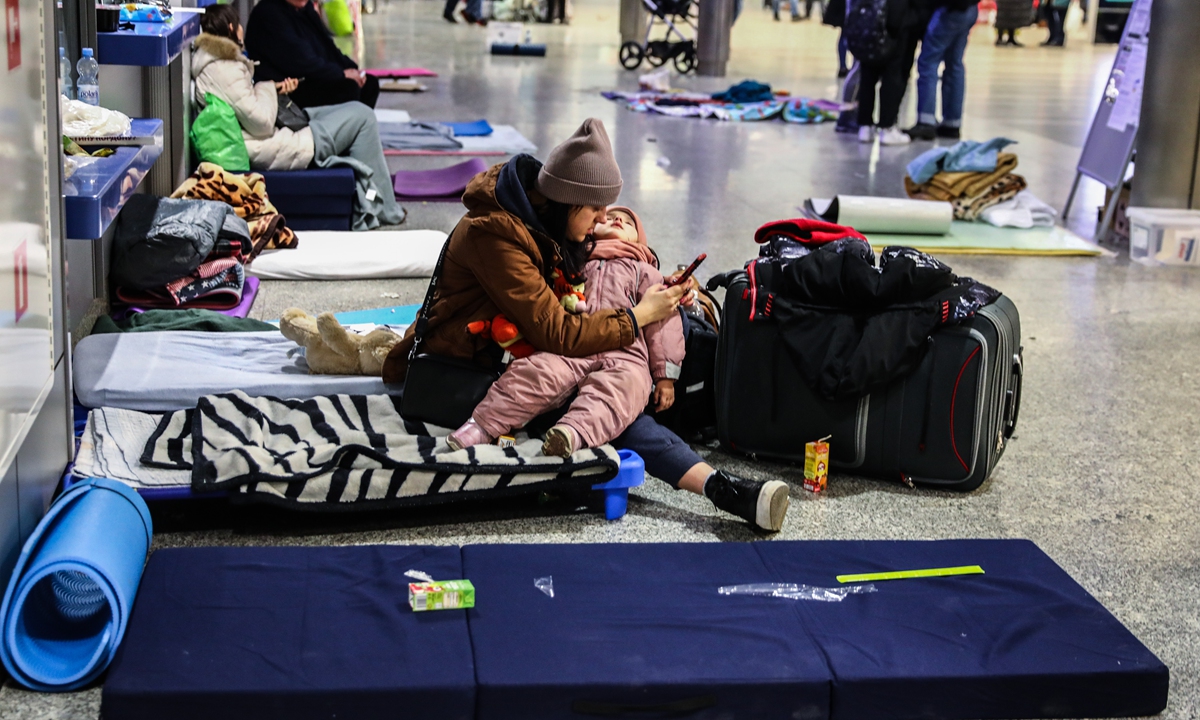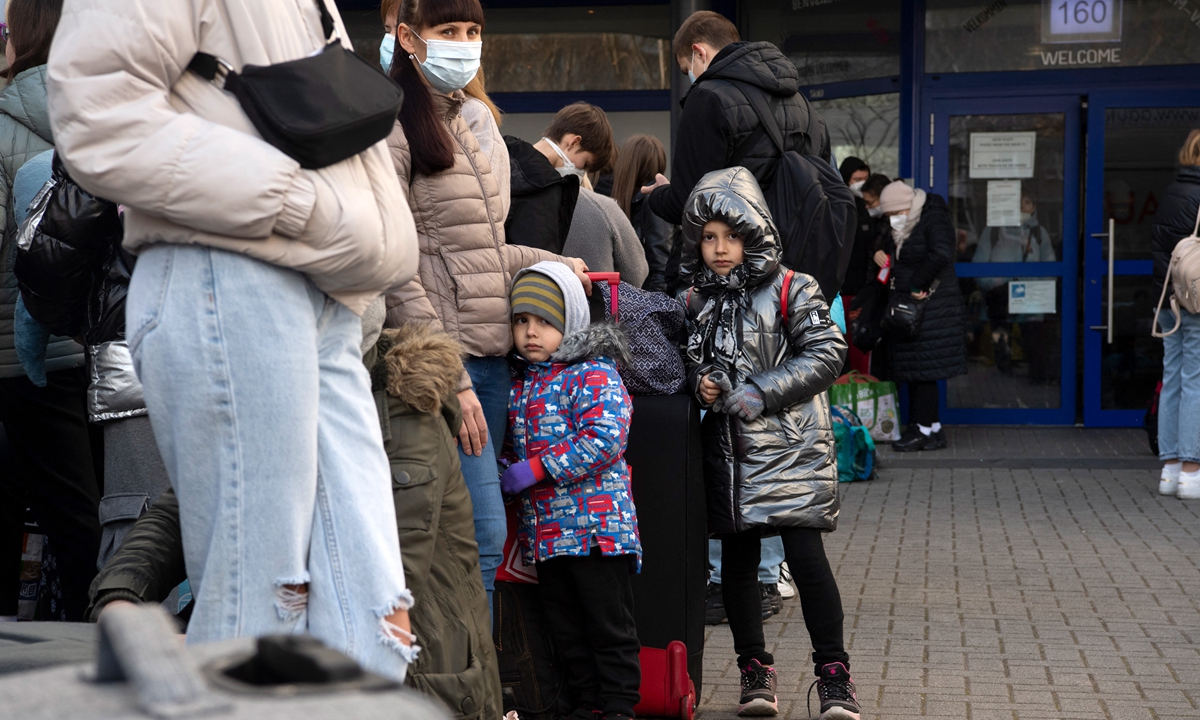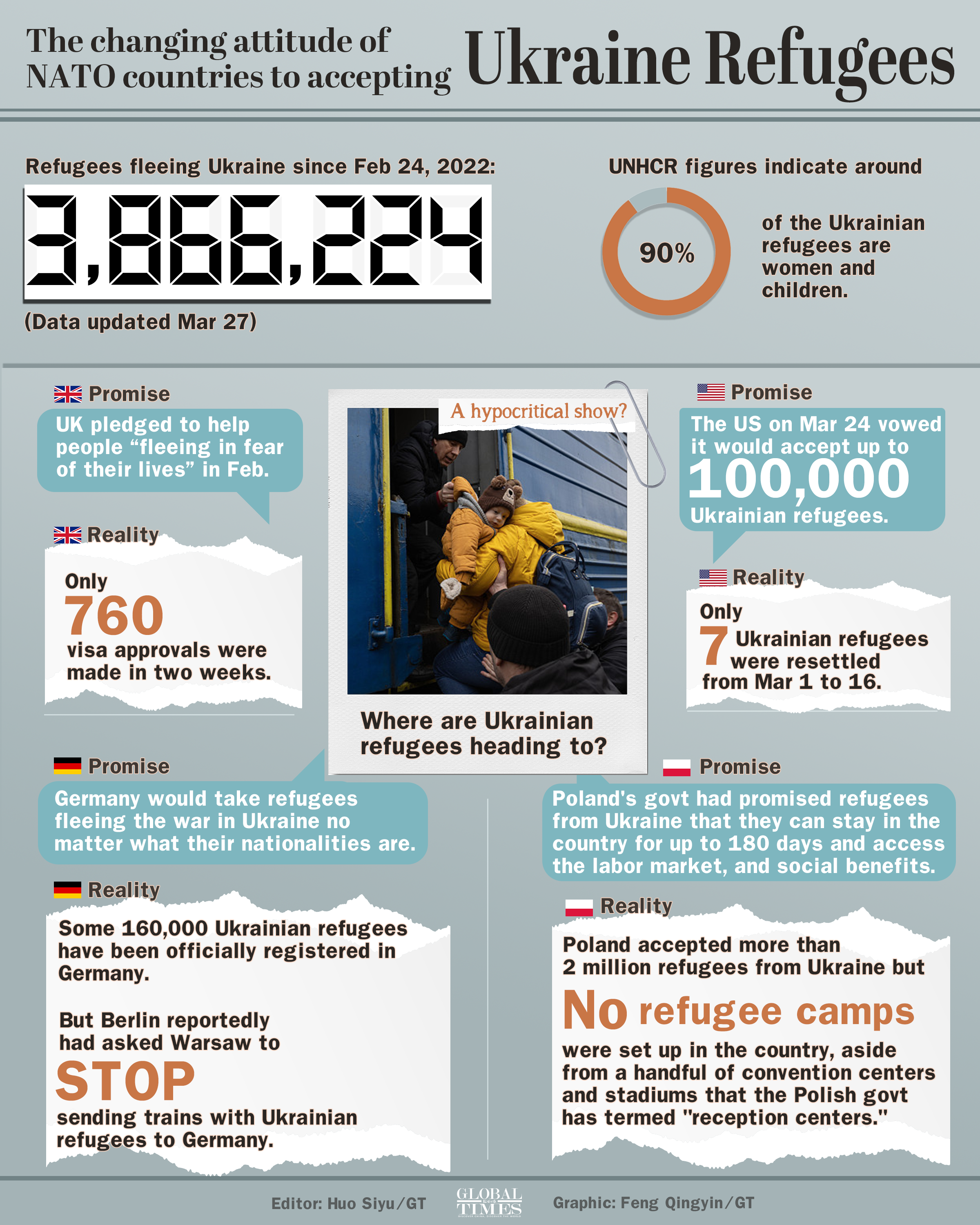
Ukrainian refugees camp out in the main railway station in Krakow, Poland on March 10, 2022. Photo: VCG
The Russia-Ukraine conflict has led to millions of Ukrainians being rendered homeless. According to data from the United Nations High Commissioner for Refugees (UNHCR), more than 3.86 million refugees had fled Ukraine by March 27, of which the overwhelming majority were women and children.
Numerous Ukrainian refugees have fled to neighboring countries including Poland and Romania, as well as further afield to the UK, France, and Germany. Unfortunately, media coverage revealed that many of the refugees are having a hard time there, seemingly having not enjoyed many of the generous promises made to them by governments and politicians of some NATO member states at the beginning of the crisis. Some European citizens even criticized or abused Ukrainian refugees online for bringing them "troubles," a far cry from the sympathy they initially showed to the Ukrainians.
The humanitarian disaster, resulting from the eastward expansion of NATO, "could soon constitute one of Europe's largest refugee crises since the Second World War," commented the United Nations Children's Fund (UNICEF) at the beginning of March. NATO member states' hypocritical and inconsistent attitude toward Ukrainian refugees is "disappointing" to the international community, said refugee experts reached by the Global Times.
As the chief culprits in this refugee crisis, some NATO members which had promoted slogans such as "embracing the Ukrainian refugees" in the very beginning would later act in a manner that belied their initial promises, said Song Quancheng, head of the Institute of Migration Studies at Shandong University.
"Their concern is not for the refugees, but for their own interests," Song told the Global Times. "They are reluctant to accept refugees when this group does not conform to their national interests."
The 'abandoned' Ukrainian refugeesAs the increasing influx of Ukrainian refugees has brought about inconveniences to the host countries, some people have now changed their initial welcoming or neutral attitudes toward the refugees. In Poland, currently the country with the largest number of Ukrainian refugees, abusive speaches and complaints against the refugees have flooded social media platforms in recent days, observers found.
For example, on Twitter, a Polish user under the Twitter handle Beth, complained of a "horrific outbreak" and a more inconvenient life caused by refugees in Poland.
"Where is the horrific outbreak in the refugee camps in Poland? Right. We are in trouble all right and it has very little to do with the COVID," she said.
Some users even used hashtags like #not_accepting and #Virus to express their discontent with their country accepting such a large number of Ukrainian refugees.
In reality, according to the Russian newspaper Vzglyad, in some parts of Poland, leaflets about "anti-Bandera" appeared on street poles, which depicted an aggressive Ukrainian attacking peaceful Poles with a pitchfork.
Stepan Bandera was a Ukrainian ultranationalist leader and ideologist known for his cooperation with Nazi Germany during World War II along with his involvement in some terrorist activities.
"Housing is not only unavailable, but it is double the price now that Poland is overwhelmed by the refugee crisis... The US government should accept refugees now!," wrote a Twitter user by the username "Mawa," who lives in New York, but her 69-year-old Ukrainian aunt became a refugee during the conflict and fled to Poland.
Mawa claimed that she and her family could not afford housing for her aunt in Poland and she continued to slam the US government's hypocritical policy toward Ukrainian refugees and officials' false concern. She said some of her critical remarks were blocked on Twitter.
However, what Mawa stands for is something that many in the West scoff at.
"Now Joe arrives and announces he's approving refugees... I smell trouble in paradise!" a US netizen on Twitter mocked Biden's visit to Poland to see Ukrainian refugees.
Similar to the netizens, governments in NATO member states seem far less enthusiastic about accepting Ukrainian refugees than they had claimed previously.
According to the UNHCR, more than 2 million refugees from Ukraine have entered Poland since the outbreak of the Russian-Ukrainian conflict in early February.
However, the Polish government has not acted actively in the face of the country's largest influx of refugees since World War II.
"Poland has revolutionized migration policy. We have received 500,000 refugees and do not have a single refugee camp," said Prezes Warsaw Enterprise Institute President Tomasz Wróblewski on Twitter.
For a long time, the Polish government did not build refugee camps, but relied entirely on hospitality from the Polish public to deal with refugee issues, according to US media outlet Politico.
Warsaw's train stations and stadiums are packed with people sleeping in camping beds because there aren't enough free rooms in the country's largest city. Volunteers have been engaged in increasingly heated exchanges with officials, who they accuse of doing too little to help organize relief efforts, Politico reported.
The US recently vowed it would accept up to 100,000 Ukrainian refugees fleeing the military conflict in Ukraine. However, the media reported that from March 1 to 16, only seven Ukrainian refugees were resettled in the US with thousands of Ukrainians gathering at the US-Mexico border, using Mexico as a transit point as they try to migrate to the US.
Berlin had also reportedly asked Warsaw to stop sending trains with Ukrainian refugees to Germany as there was already "a bottleneck situation there [in Germany]."
In the UK, although a new scheme has been launched for hosting Ukrainian refugees, British officials and politicians warned that the system was "far too complicated" and the Home Office's response was "too slow, too narrow, [and] too mean." Only 760 visa approvals were made in two weeks, media reported, which Ian Blackford, the Westminster leader of the Scottish National Party, said "is disgraceful."
A bleak futureUNHCR figures indicate that around 90 percent of Ukrainian refugees are women and children. With the passive response of NATO destination countries, this vulnerable group has faced safety risks after fleeing Ukraine. Some tragedies have even occurred, such as some female Ukrainian refugee being raped in the places where they sought refuge, or it has been reported at times that human traffickers had tried to pick up Ukrainian children and women traveling by themselves.
At a train station on the Polish-Ukrainian border where many Ukrainian refugees are camping out, a female refugee told BBC that "anyone can turn up at this station," and she saw three men from Italy who "were looking for beautiful women to sell into the sex trade," according to a BBC article on Monday.
In Poland, a man was arrested in earlier March for allegedly raping a 19-year-old girl who fled Ukraine, reported Newsweek. Police in Warsaw said the 49-year-old man assaulted the refugee after he lured her in with police offers of help over the internet.
"She trusted a man who promised to help and shelter her. Unfortunately, all this turned out to be deceitful manipulation," Newsweek cited the local police's statement as saying.
In Germany, two men assaulted in mid-March a Ukrainian teenager who was staying in a hotel boat for refugees, said the Associated Press on March 16. Police in Berlin posted signs in the city's main train station warning young people and women to beware of suspicious offers and report them to officers, it said.
Refugee experts are not optimistic about the current situation or the future of the refugees. "They are not welcome in destination countries," Song told the Global Times, saying these countries stand to gain little by accepting Ukrainian refugees.

Refugees from Ukraine stand in front of a hotel in Berlin, Germany. They had to leave the hotel because the contract the hotel owner had with the operator expired. Photo: AFP
"Compared with the refugees who went to Germany between 2015 and 2018 - about 70 percent of whom were a potential labor force - most of the Ukrainian refugees are vulnerable groups that need help," Song told the Global Times.
Therefore, the millions of Ukrainian refugees escaping to destination NATO countries can hardly solve Europe's labor shortage, said Song. They will, instead, bring heavy economic burdens, which is "unbearable" to these destination countries, he noted.
The politicians in NATO member states who were originally keen on promoting slogans like "welcome refugees" at the beginning of the Ukraine crisis out of either empathy for the refugees or the purpose of increasing pressure on Russia, didn't seem to expect such a large number of female and underage refugees, Song analyzed.

The changing attitude of NATO countries to accepting Ukraine refugees Editor: Huo Siyu/GT Graphic: Feng Qingyin/GT
NATO as the chief culprit Before a large number of Ukrainian people even flooded into Europe seeking safety, Europe was already grappling with refugee crises. Such experiences have raised questions on whether the continent can cope with much larger numbers when there are still many Syrian and Afghan refugees who still find it difficult to secure themselves homes and true acceptance in Europe.
According to the New York Times, the UK evacuated about 16,000 people from Afghanistan in 2021. Most of them have been living temporarily in hotels across the UK ever since, a situation that British lawmakers have said is increasingly untenable. In response, the UK said a key reason for the situation is a shortage of affordable housing across the country.
But some experts were quoted by the media as saying that the Ukrainian refugees would likely face a more welcoming environment in Europe because "they are white."
Andrew Geddes, director of the Migration Policy Centre at the European University Institute, told ABC News that "the EU is much more willing to internalize a refugee situation where the people who are being forced to flee are white Europeans, and has been much more reluctant to offer protection for people who are from Africa and the Middle East."
That has revealed a double standard shaped not only by race, religion, and culture, but also by politics, by the EU toward white and non-white refugees, experts told ABS News.
From the war in Syria in 2005 to the current Ukrainian crisis, US-led NATO has been the chief culprit in various refugee crises. The NATO has plunged the Middle East and Eastern Europe into never-ending troubles, causing humanitarian disasters around the world that have resulted in large numbers of homeless people, scholars in international relations and refugee studies pointed out.
US-led NATO should have taken responsibility and taken in the refugees, Song said. "But their priority is their own interests, not the lives of refugees."
The Ukraine crisis has created several millions of refugees, and the US "knows the consequences," Chinese Foreign Ministry spokesperson Zhao Lijian said at a media conference on March 18. "...as the one who initiated and instigated the conflict, the US is hypocritical on the issue of refugees," said Zhao.
The US should deeply reflect on the root causes of the refugee problems in Ukraine, he noted.






